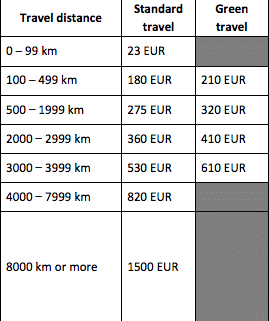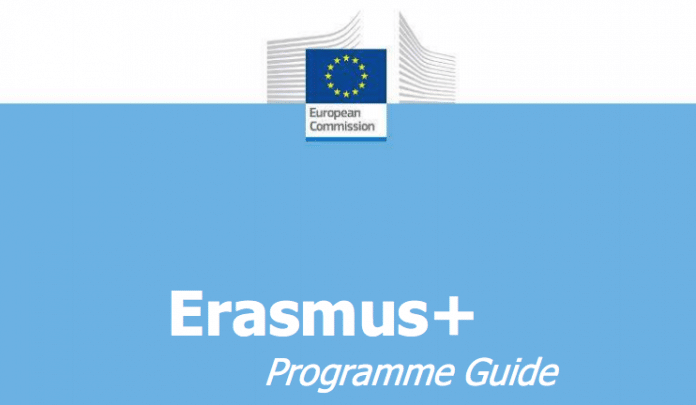On March 25th 2021 the European Commission has released the announcement of the Erasmus+ 2021 Guide being available, along with the Call for Proposals.
We have been through the Guide 2021 to spot the differences with the last Guide and point out the most interesting features. Following a summary of our findings.
Deadlines 2021
- May 11th 2021, 12.00pm (Brussels time) for projects starting between August 1st 2021 and December 31st 2021;
- October 5th 2021, 12.00pm (Brussels time) for projects starting between January 1st 2021 and May 31st 2021.
Technical Features
Youth Exchanges
| Eligibility Period | 3-24 months |
| Activity duration | 5-21 days |
| Number of Organisations | At least 2, from different countries |
| Min-Max of Participants | 16-60 Minimum of 10 participants for a Youth Exchanges involving ONLY participants with fewer opportunities |
| Dimension of international groups | Not specified. MANDATORY at least a group leader. Maximum 1 facilitator. |
| Age of Participants | 13-30 Group leader: 18+ |
| Organisational Support | 100€ for participant, excluding leaders, facilitators, accompanying persons (for which a lump sum apply) |
| Inclusion Support | 100€ for participant with fewer opportunities (lump sum) 100% of the real costs linked to the participant’s involvement |
| Individual Support | 39€ per day per person (lump sum) in Italy. See the table A2.1 (page 134) to check on other countries |
| Exceptional Costs | Expensive travel costs: 80% of eligible costs Visa and visa-related costs, residence permits, vaccinations, medical certifications: 100% of eligible costs |
| Preparatory Visit Support | A maximum of 1 participant per participating organisation (excluding the hosting organisation) |
| Preparatory Visit Support: Budget | 575€ per participant |
Youth Workers Mobility (Training Courses, Seminars, Study Visits, Job Shadowing)
| Eligibility Period | 3-24 months |
| Activity duration | 2-60 days |
| Number of Organisations | At least 2, from different countries |
| Min-Max of Participants | Maximum 50 participants (excluding trainer and facilitator) |
| Dimension of international groups | – |
| Age of Participants | 18+ (no group leader) |
| Organisational Support | 100€ for participant, excluding leaders, facilitators, accompanying persons (for which a lump sum apply) |
| Inclusion Support | 100€ for participant with fewer opportunities (lump sum) 100% of the real costs linked to the participant’s involvement |
| Individual Support | 66€ per day per person (lump sum) in Italy. Max 1.100€ per person. See the table A2.2 (page 147) to check on other countries |
| Exceptional Costs | Expensive travel costs: 80% of eligible costs Visa and visa-related costs, residence permits, vaccinations, medical certifications: 100% of eligible costs |
| Preparatory Visit Support | A maximum of 1 participant per participating organisation (excluding the hosting organisation) |
| Preparatory Visit Support: Budget | 575€ per participant |
Travel Expenses
The travel expenses (costs of participants, including accompanying persons and facilitators, from their place of origin to the venue of the activity and return) are calculated by the Financing mechanism as contribution to unit costs. It is a lump sum.

News:
- Green Travel: as you cant tell from the table above, a Green Travel option (transport with low emissions, as trains, buses and carpooling) receives different funding.
- Travelling Days: with traditional transport: 1 day before and after the activity; with green transport: up to 4 days.
Remember that for each travelling day the participant is eligible for the Personal Support funding (that differs from one country to another).
Programme Countries
Member States of the EU: Belgium, Bulgaria, Czech Republic, Denmark, Germany, Estonia, Ireland, Greece, Spain, France, Croatia, Italy, Cyprus, Latvia, Lithuania, Luxembourg, Hungary, Malta, Netherlands, Austria, Poland, Portugal, Romania, Slovenia, Slovakia, Finland, Sweden.
Non-EU Programme Countries: Republic of North Macedonia, Iceland, Norway, Serbia, Lietchtenstein, Turkey.
Partner Countries:
– Western Balkans (Region 1): Albania, Bosnia and Herzegovina, Kosovo, Montenegro.
– Eastern Partnership countries (Region 2): Armenia, Azerbaijan, Belarus, Georgia, Moldova, Territory of Ukraine as recognised by international law;
– South-Mediterranean countries (Region 3): Algeria, Egypt, Israel, Jordan, Lebanon, Libya, Morocco, Palestine, Syria, Tunisia;
– Russian Federation (Region 4): Territory of Russia as recognised by international law.
Read also




